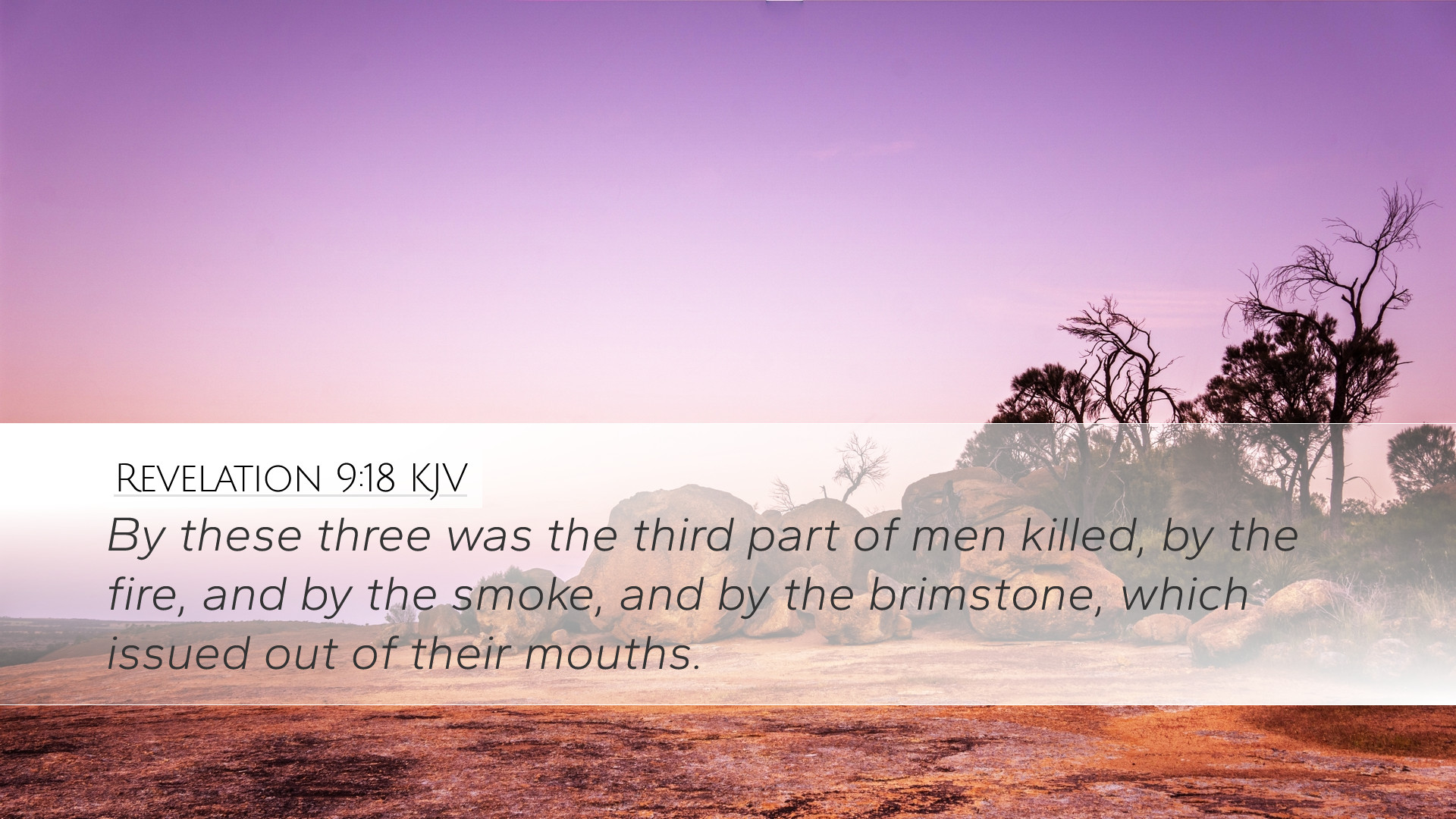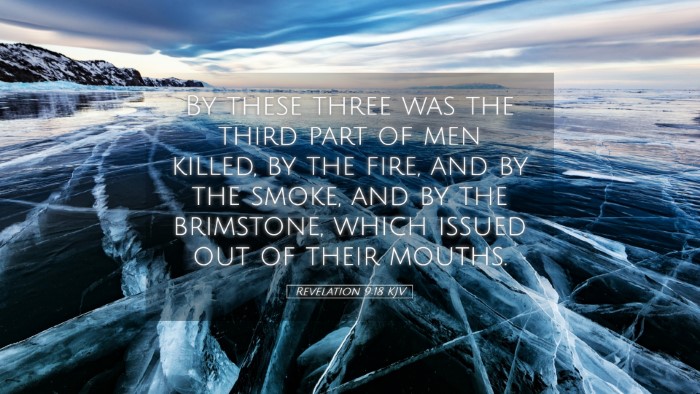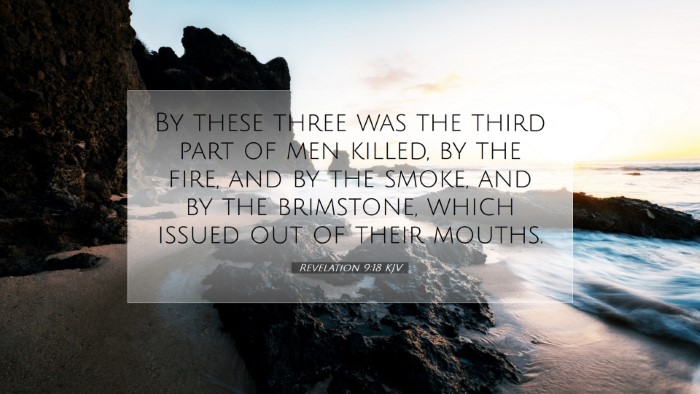Commentary on Revelation 9:18
Verse Text: "By these three was the third part of men killed, by the fire, and by the smoke, and by the brimstone, which issued out of their mouths."
Introduction
The Book of Revelation is a profound and complex text, offering various prophetic interpretations and symbolisms. In Revelation 9:18, we find a striking depiction of devastation characterized by three destructive elements: fire, smoke, and brimstone. This verse situates itself amid the narrative surrounding the trumpet judgments, specifically highlighting the catastrophic consequences following the fifth and sixth trumpet. The public domain commentaries provide a range of insights into its implications for understanding both the spiritual and physical realities depicted in this apocalyptic literature.
Key Insights from Commentaries
-
Matthew Henry's Insights
Henry emphasizes the severity of God's judgments manifested through these symbols. He considers that the "third part of men" signifies the substantial impact of these catastrophes on humanity. Fire, smoke, and brimstone represent different aspects of divine judgment that not only cause physical destruction but also moral and spiritual degradation.
-
Albert Barnes' Commentary
Barnes elucidates that the imagery of fire, smoke, and brimstone recalls judgment themes found in the Old Testament, particularly the destruction of Sodom and Gomorrah. He interprets the "fire and smoke" as representing the potent judgment and chaos resulting from divine wrath. He also notes that the casualties referred to here demonstrate the seriousness of rejecting God, as a significant part of humanity faces condemnation due to spiritual blindness.
-
Adam Clarke's Perspective
Clarke provides a detailed analysis of the symbolic meanings behind the elements in this passage. He suggests that "fire" indicates destructive passion, "smoke" represents the obscuring of truth, and "brimstone" implies divine wrath. He relates this to the condition of the world during the last days, where many will be led astray by the deceptions of false teachings, resulting in widespread moral collapse and suffering. Clarke illustrates the necessity of discernment and a faithful response to God amidst these dire circumstances.
Theological Implications
Understanding Revelation 9:18 through the lens of these commentaries opens up significant theological discussions concerning God's judgment, human response, and the ultimate fate of humanity. This verse reflects God's righteousness in judgment and serves as a dire warning to those who remain in rebellion against Him. Church leaders and scholars must grapple with the imagery here to offer meaningful teaching on the nature of sin and its consequences.
Fire as Judgment
The motif of fire as a judgment tool is not unique to Revelation. It carries heavy biblical precedent, manifesting as a refining force for believers and a consuming force for the wicked. Henry's view emphasizes that fire purifies and destroys, symbolizing both the transformative work that God does in believers’ lives and the ultimate judgment awaiting those who reject Him.
Smoke as Deception
Smoke serves as a sobering reminder of the obfuscation of truth in the last days. Those ensnared in deception may find themselves distant from the true path of righteousness. Barnes points out that humanity’s collective choices lead to spiritual blindness, requiring the church to actively dispel confusion through sound doctrine and the proclamation of the gospel.
Brimstone and Divine Wrath
Brimstone, often associated with sulfur and the idea of festering judgment, signifies the reality of God’s wrath as described in Clarke’s commentary. It serves to awaken a sense of urgency for repentance and calls individuals to recognize the severity of the consequences of sin. The imagery of brimstone reminds readers that while God is loving and merciful, He is also just and will not overlook transgressions indefinitely.
Practical Applications
Given the weight of Revelation 9:18, the church and its leaders are encouraged to convey messages that reflect both the severe consequences of rebellion and the hope found in Christ. A few practical applications include:
- Proclaiming the Gospel: The urgency of repentance must be a central theme in sermons, emphasizing God's patience yet underscoring His impending judgment.
- Discipleship and Teaching: Encourage deeper biblical literacy among believers, fostering an environment where truth is prioritized, thereby reducing susceptibility to deception.
- Community Reflection: Create spaces for communal reflection on sin, judgment, and grace, allowing the body of Christ to cultivate a healthy understanding of these essential theological concepts.
- Prayer for Discernment: Encourage prayer for wisdom and discernment as believers navigate challenging moral landscapes, equipping them to stand firm in faith.
Conclusion
Revelation 9:18 serves as a poignant reminder of the reality of divine judgment as well as the profound implications of sin. Through the insights of Matthew Henry, Albert Barnes, and Adam Clarke, we are led to understand the complexities of God's dealings with humanity. Ultimately, this verse challenges both pastors and scholars to communicate God's message faithfully, balancing the seriousness of His judgment with the hope instilled by His grace. It calls for continual vigilance in spiritual matters, urging believers to pursue truth amid the chaos of a world in rebellion against God.


